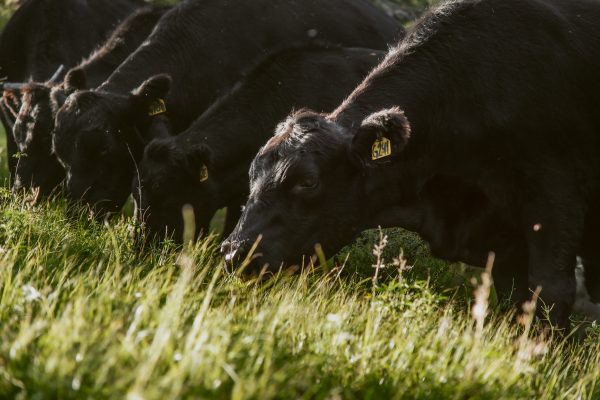 In minutes, they come running in. It can be quite a stampede of cattle and horses coming fast. Our herd is small enough that you get an eye for many individuals. Although most of them are black hided, there is a great deal of individuality in beeves. When feeding hay, it is the same ones that come right up to you as you pull out the pocket knife and cut strings to crack open fresh 1800 lb bale of summer hay—eager to see how the green will unfold. Their wet noses inhale deeply of the sweet grass fragrance.
In minutes, they come running in. It can be quite a stampede of cattle and horses coming fast. Our herd is small enough that you get an eye for many individuals. Although most of them are black hided, there is a great deal of individuality in beeves. When feeding hay, it is the same ones that come right up to you as you pull out the pocket knife and cut strings to crack open fresh 1800 lb bale of summer hay—eager to see how the green will unfold. Their wet noses inhale deeply of the sweet grass fragrance.
Lacey, one of our larger mama cows is almost obnoxious with the body slam that I sometimes undergo when cutting strings. I’ll get clobbered in the kidneys by her while I’m minding my own business with my knife. She is just a little selfish and wants to be first—she still has a baby to feed, after all. Several days ago I almost lost my balance when she ran into me. It’s a little unnerving, especially when there is a sea of clamoring critters surrounding; pressing in. It’s why I keep the younger girls and even dogs high up on the wagon, away from the chaos. On the other hand, it is here where I get an up-close-and-personal look at each of them, and although wild range cattle, they are comfortable around me.
This is us with our beeves. We do this every day. It is where protein for your table comes from. To know this about Alderspring is in a different league compared to simply knowing where in the world you beef was produced through Country of Origin Labeling (COOL). It is knowing us, and something about the story of how we raise your food. That’s why I’m very surprised that the repeal of COOL by President Obama on December 21 has caused such uproar in not only the beef industry, but consumer groups nationwide.
The regulation mandating COOL on meat products sold in the US was published in May of 2013. It required that all retailers inform customers through labeling or signage the nation where the products originated. Its passage was lobbied for heavily by grass roots cattlemen’s groups to establish a difference definable by consumers between meat produced domestically and abroad.
Now with the repeal of Country of Origin Labeling regulation, the beef you purchase in the supermarket can come from anywhere in the world, and you have no way of knowing its place of origin. Meatpackers can even use the words “Grass-fed” on the label when describing their product, because the regulation covering that claim was repealed the month before.
But isn’t up to us to source verify our own food? Why would we trust our or any government for providing information on which our wellness rests, in that most foundational aspect of self-care: deciding what to eat.
I am continually amazed that Americans spend 4 times as much on consumer goods such as microwaves, TVs, and stereos than food when it is what they eat that affects their longevity and quality of life the most. Diabetes, obesity, heart disease, cancer and autoimmune disease are plagues in our country, and are directly traceable to bad nutrition choices even within the parameters of conventional medicine. Folks fail to make the common sense realization that foraging for their food, and investing time and money in that pursuit is more important in this day and age than ever. And the tools to do that well are unprecedented with fast shipping, and internet connectivity.
Today’s social media world allows us to connect directly with our farmer/rancher. You can practically come with me as we feed our beeves on a cold winter day. And soon, you can watch spring unfold over our mountain valley, and soon hear the sound of redwings in the cattails along the Pahsimeroi River as we slice open green hay from last summer—all in within the words of these newsletters or on facebook posts. Bring your friends and family along by sharing! Who cares about Country of Origin Labeling anyway?
Our beeves sure don’t, and neither should you.
Happy trails!







Leave a Reply